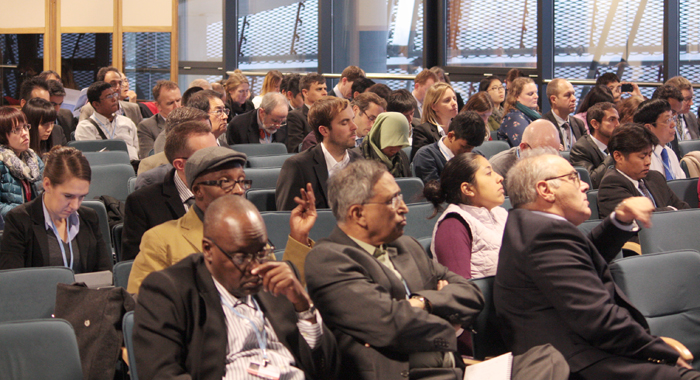
WARSAW, Poland — Developing countries can forget about the moral argument when trying to get richer nations to adjust their actions to mitigate against the devastating effect of climate change.
“That doesn’t tickle anyone,” a source with insider information on the talks told reporters as the 19th session of the Conference of the Parties to the United Nations Framework Convention on Climate Change (UNFCCC) and the 9th session of the Conference of the Parties entered its second day on Tuesday.
The Philippines has demanded that Parties move to raise now — seven years ahead of the target date — the US$100 million planned contribution to climate finance.
However, the source says that the country, which is prone to various natural disasters, such as last weekend’s typhoon, which is estimated to have claimed 10,000 lives, could forget about the moralistic arguments, because they do not in any way pressure richer nations to act.
Rather, the world’s largest economies are moved by economic and political considerations, or when a developing country uses green technology in a way that shows up their richer counterparts.
“Basically, if you want to encourage the United States of this world, the Germanys or the UKs, just making demands is actually not enough,” said the source who asked not to be identified.
“If there are more signals from developing countries saying, ‘We insist that developed countries must lead, … but look at what we are doing in our own countries. We are now building solar farms and wind farms; we are implementing. Why aren’t you?’ I think that will be a much stronger argument for the public than hunger strikes or people saying give us some money and we will do something or it is your fault,” the source further said.
“This whole moralistic stuff, it doesn’t tickle anyone in the west. And, above all, it doesn’t tickle hardnosed government negotiators. The only thing that works in developed countries is encouragement.”
The source noted that Germany, where there is “as much sun as Alaska”, generated 69 per cent of its energy needs in one day using sun and wind.
“That happened in October. And just think about how much sun developing countries have,” said the source, who is an expert on climate change negotiations.
Arguments about green growth, jobs, renewables, clean technology, rather than moralistic, urgings, provide more impetus for the develop world, the source said.
“If you just bring it down to morals, people are not interested in that. They are interested in jobs, they are interested in economics, in competitiveness. Those are the only things that tickle them in the real world.”
But the source pointed out that the moral argument has to be made and that the COP is the place make it.
“It has been made for 20 years and it should be continued to be made but the moral argument is not going to solve things. The question is, what is going to make a difference to emissions? Talking about justice is not going to bring about solutions. It won’t help.”
These are the realities confronting developed countries ahead of talks about climate finance next week, which is expected to be confrontational and contentious.
The parties have agreed to a contribution of US$30 billion annually and this has been provided as agreed.
The European Union is saying that it fully intends to live up to their share of climate finance, which will be ramped up to US$100 billion by the end of the decade.
The source said that none of the developed countries have reneged on their commitment to the fund, but pointed out that this is not for moralistic reasons.
“They are doing it in their own interest. The United States has had [Hurricane] Sandy, there has been heat waves in Europe. So it is also a survival tactic for the global north, providing money and technology, because they know that if they don’t, they will bare the consequences as much as anybody else in the long run.”
However, developing countries should not expect much in terms of deliverable by the time the talks end next week.
“This COP is not a COP for delivering anything. It is a progress COP. … Is you are looking for some flashing headlines, this is not the COP for it. Come to Paris or Lima,” another insider said.
This negative outlook stands in stark contrast to the call by Christiana Figueres, executive secretary of the United Nations Framework Convention on Climate Change, that COP 19 must deliver on several key areas.
“We must clarify finance that enables the entire world to move towards low-carbon development. We must launch the construction of a mechanism that helps vulnerable populations to respond to the unanticipated effects of climate change,” she told the opening ceremony on Monday.





